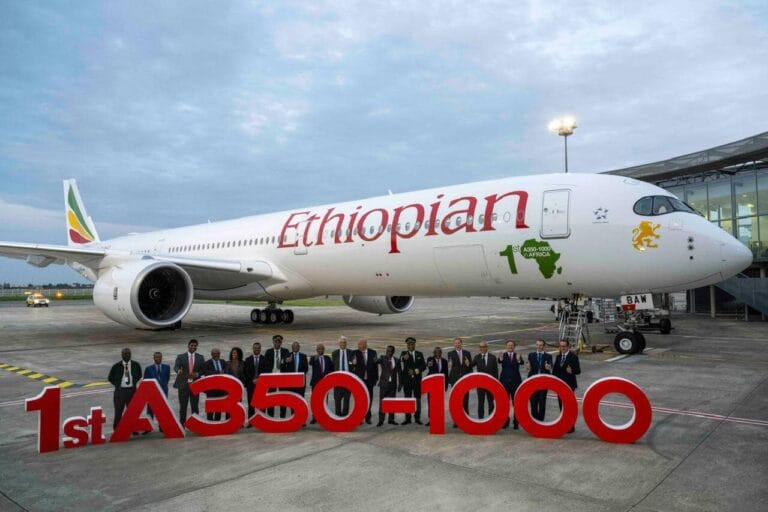Ethiopian Airlines has officially taken delivery of an A350-1000 aircraft from Airbus in Toulouse, France, becoming the first African-based operator. This new addition is expected to enhance Ethiopian’s premium services on major international routes, including Washington D.C., London, Paris, and Frankfurt, as the airline pursues further growth and innovation in passenger experience.
Fleet commonality
The A350-1000 joins Ethiopian Airlines’ expanding fleet of A350 aircraft, which currently includes 21 A350-900 models. With the addition of 14 more A350s planned over the coming years—including three more A350-1000s and eleven A350-900s—Ethiopian Airlines aims to achieve an optimal balance of capacity, efficiency, and operational commonality.
By leveraging the shared characteristics between the A350-900 and A350-1000, Ethiopian will simplify its pilot and maintenance training processes, helping to reduce costs and streamline operations.
This operational commonality is especially important as Ethiopian Airlines expands its long-haul service. The ability to interchange pilots and mechanics between aircraft types facilitates more flexible scheduling and quicker adaptation to varying demand levels across routes. This integration highlights Ethiopian’s commitment to maintaining an efficient, sustainable fleet that can support its ambitious expansion plans.
Benchmark in efficiency
The Airbus A350 is widely regarded as one of the most fuel-efficient and eco-friendly widebody aircraft available. The A350’s design includes advanced aerodynamics and new-generation engines, which contribute to lower fuel consumption and reduced emissions compared to previous models. The aircraft’s use of lightweight composite materials also supports fuel efficiency, helping Ethiopian Airlines to lower its operational costs and reduce its environmental impact.
In line with global aviation’s push for sustainable solutions, the A350 is compatible with up to 50 percent Sustainable Aviation Fuel (SAF), an alternative fuel that significantly reduces carbon emissions. Airbus has announced a commitment to make the A350 100 percent SAF-compatible by 2030, aligning with Ethiopian Airlines’ own sustainability goals and supporting the broader industry’s efforts to decarbonise.
Elevating African aviation
The addition of the A350-1000 marks a move forward in Ethiopian Airlines’ journey to become a leader not only in African aviation but also in global connectivity and customer service excellence.
As Africa’s first operator of the A350-1000, Ethiopian Airlines is setting a new standard for long-haul travel across the continent. This development strengthens Africa’s position in the global aviation industry, showcasing Ethiopian Airlines as a carrier capable of offering world-class services and facilities on par with other major international airlines.
With a fleet that continues to grow in both size and sophistication, Ethiopian Airlines is well-positioned to expand its reach across continents while delivering a premium flying experience. The A350-1000 represents a future-focused investment that reflects the airline’s commitment to innovation, efficiency, and sustainable growth.




